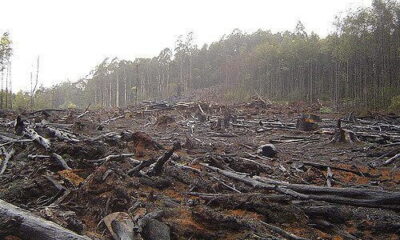

Environment
Report to map ‘underestimated’ loss of carbon from tropical rainforests
A soon-to-be-published report is set to say that the amount of carbon being lost by the degradation of tropical rainforests is underestimated.
The new research says the current method of using satellites to assess tree numbers is ineffective at monitoring selective logging and ‘fringe’ element deforestation.
Lead author Dr Erika Berenguer from Lancaster University told the BBC, “It’s been completely overlooked. When we talk about deforestation, we completely remove the forest and all that carbon is lost.
“When you talk about degradation it’s more cryptic. Chunks of the forest are affected, but when look from the satellite image you still see the trees, you just don’t know the condition, and that is why it is overlooked.”
Selective logging and fires cause large amounts of “hidden emissions” and have been calculated to cause the equivalent to 40% of total deforestation emissions.
The team of scientists combatted the issue of satellite observation by using on-the-ground assessments. Some 70,000 trees were measured from different tropical rainforests and over 5,000 soil samples were taken to be analysed.
Deforestation has been a large source of human-induced global carbon emissions for many decades – currently around 12% in total, the same as both agricultural and transport emissions combined.
A problem with analysing the total damage caused is the private ownership of land occupied by the tropical rainforests. The extensive co-operation needed with the land owners to carbon count and analyse the forests makes the process far slower and arduous – a problem made worse by a lack of state support in these developing countries.
Greenpeace recently revealed details of illegal Amazon logging activities, highlighting that two-thirds of the timber illegally taken from the rainforest was shipped to the US and EU.
Meanwhile, in 2013 a report showed that deforestation had increased by 88% in 2012, with 1,570 sq km of forest lost between August 2012 and April 2013.
The Lancaster team believe their report to be the most accurate inkling yet into the scale of emissions from this source. They believe that in 2010, 54 billion tonnes of carbon emissions were released into the atmosphere because of the degradation of forests.
The full research will be published in the journal Global Change Biology on June 3.
Photo: Leonora Enking via Flickr
Further Reading:
Speed of amazon deforestation increased by 88% in 2012
Greenpeace reveals illegal amazon logging activities
Tackling deforestation through REDD+ will cost $12 billion report warns
Drug trafficking contributing towards deforestation in Central America


 Environment11 months ago
Environment11 months agoAre Polymer Banknotes: an Eco-Friendly Trend or a Groundswell?

 Features10 months ago
Features10 months agoEco-Friendly Cryptocurrencies: Sustainable Investment Choices

 Features11 months ago
Features11 months agoEco-Friendly Crypto Traders Must Find the Right Exchange

 Energy10 months ago
Energy10 months agoThe Growing Role of Solar Panels in Ireland’s Energy Future





























